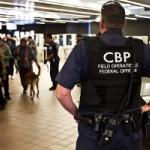Aggressive Interrogation of Artists and Writers at U.S. Border

The Trump Administration’s draconian immigration policies, from the Muslim ban to the deportation by Immigration and Customs Enforcement officers of hard-working parents who have no criminal record and young adults who know no other home, have drawn widespread criticism and protest.
In addition to these heart-wrenching, horrifying stories, more and more reports are emerging of travelers—including U.S. citizens returning home—being subjected to aggressive interrogations at the border that leave them humiliated, angry, and bewildered. Several prominent writers have spoken out in recent weeks about such experiences, which have altered their views of the United States and what it stands for.
The bestselling children’s book author Mem Fox, an Australian citizen, was detained in late February at the Los Angeles International Airport while en route to a conference in Milwaukee. She was detained for nearly two hours by Customs and Border Patrol officials who reportedly believed she was traveling on the wrong visa, although Fox says she has traveled to the U.S. over 100 times before without any incident. Her interrogation was so aggressive that she said she “felt like I had been physically assaulted.” Fox, whose most recent book I’m Australian, Too is a celebration of immigration and Australia’s multicultural heritage, eventually received an apology from the U.S. embassy in Australia. But in reflecting on her ordeal, she emphasized its broader ramifications, noting, “They made me feel like such a crushed, mashed, hopeless old lady and I am a feisty, strong, articulated English speaker. I kept thinking that if this were happening to me, a person who is white, articulate, educated, and fluent in English, what on earth is happening to people who don’t have my power?”
Also in late February, Henry Rousso, a celebrated French historian of the Holocaust who was born and raised in Egypt, was detained for 10 hours at the George Bush Intercontinental Airport in Houston. Rousso, author of The Vichy Syndrome, about France’s struggle to reckon with its World War II history, was traveling to a symposium at Texas A&M University. Border officials questioned him about his visa and accused him of attempting to work illegally in the U.S. Rousso was first told that he would be deported, but was eventually released after Texas A&M learned of the situation and intervened. Like Mem Fox, Rousso’s experience has altered his view of the United States, as he wrote:
This incident has caused me some discomfort, but I cannot stop thinking of all those who suffer these humiliations and legal violence without the protections I was able to benefit from. …How can one explain this zeal if not by the concern to fulfill quotas and justify increased controls? That is the situation today in this country. We must now face arbitrariness and incompetence at all levels. I heard recently that “Paris isn’t Paris anymore.” The United States seems no longer quite the United States.
Aaron Gach, an American media artist and founder of the Center for Tactical Magic, contacted PEN after he was detained on February 23 on his return home to San Francisco from an art show in Brussels. Gach was subjected to detailed questioning regarding an art exhibition in which he had participated in Belgium, including questions about why he was invited, who invited him, and how often he takes part in such exhibits. Gach’s pieces included in the exhibition focused on issues related to incarceration in the United States; he is unsure whether he was detained in connection with his work. Gach was repeatedly asked to allow CPB agents access to his personal phone by turning it over and providing his password; when he finally agreed, the phone was removed from his sight for several minutes before being returned to him.
In the wake of reports like these and the expectation that a new travel ban will be issued at any moment, PEN America is hearing from artists, writers, poets, and other cultural and intellectual figures who are newly worried about making trips to the U.S., afraid of being turned away at the border, made to submit to invasive searches of their smartphones, interrogated about their political opinions and religious beliefs, or being subjected to arbitrary tests of their abilities. In a few short weeks, a pervasive fog of fear has encircled our borders, and it will deter countless people from even attempting to visit the country.
This, too, is a cost of President Trump’s immigration policies, and it will take a severe, long-lasting toll on America’s cultural and intellectual life. As we wrote in a letter to President Trump signed by sixty prominent writers urging him not to issue a new travel ban:
Arts and culture have the power to enable people to see beyond their differences. Creativity is an antidote to isolationism, paranoia, misunderstanding, and violent intolerance. In the countries most affected by the immigration ban, it is writers, artists, musicians, and filmmakers who are often at the vanguard in the fights against oppression and terror. Should it interrupt the ability of artists to travel, perform, and collaborate, such an Executive Order will aid those who would silence essential voices and exacerbate the hatreds that fuel global conflict.
America’s status as a world-class cultural hub, as a proponent of free thought and lively debate, as a country that celebrates our diversity and welcomes new voices and new ideas from all corners of the world, is crumbling. The image of a shining city on a hill is erased, and in its place rises a forbidding, angry, hostile country that talks of building walls and banning outsiders. We will all be poorer for it.
